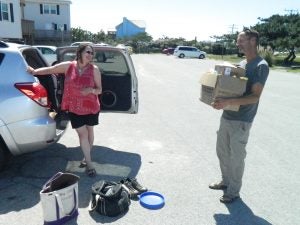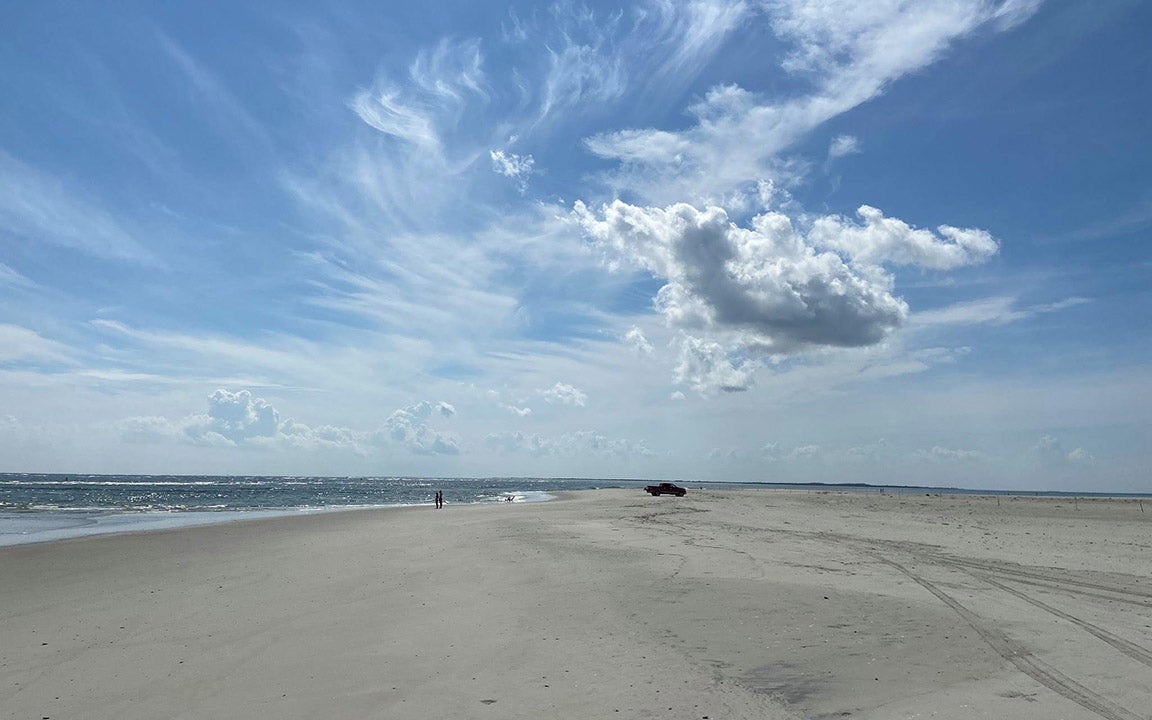Facing Dorian evacuation, vacationers pack up and head home
Published 7:04 pm Tuesday, September 3, 2019

- Karen Dougherty checks to make sure both bicycles are secure Tuesday morning before making the eight hour trip home to Pennsylvania. Philip S. Ruckle Jr.
Home to a coastline sticking out into the Atlantic Ocean, the Outer Banks has always been vulnerable to a direct hurricane strike.
As Hurricane Dorian churns off the coast of Florida, the Dare County Control Group met Monday afternoon to receive a National Weather Service briefing which led to a state of emergency declared for the entire county.
In preparation for the heavy winds, strong thunderstorms and potential for flooding, tornadoes and storm surge, visitors were ordered out Tuesday, with all other residents to leave Wednesday.
Even if Hurricane Dorian spins out to sea, a stream of people clogging the roads headed north and westbound are sure to leave a mark on the area’s vacation rental economy.
Resort Realty CEO Stuart Pack estimated that about 30 percent of his renters departed Monday.
“I’m sure 30 percent or so already left yesterday,” said Stuart on Tuesday morning. “We saw the traffic headed out. It’s a mandatory evacuation, they have to go.”
Closed half a day Monday for the Labor Day holiday, the evacuation order has left Pack and other rental agencies scrambling to get things in order in the event Dorian does hit the area.
“We are trying to connect and have everybody in the field that we possibly can,” added Pack. “We are waiting to hear from Emergency Management on how quickly we can get our staff back in. Half of our staff probably live in Elizabeth City and Currituck, so they will have to come back with Essential Personnel Two or something. There are just a hundred unknowns at the moment. I wish I could get someone from Emergency Management to respond to us.”
In response to the evacuation order, Bob Oakes, president of Village Realty, was out securing furniture to the rails at a home in his vacation rental program.
Oakes went on to say a number of his renters also made an early exit.
Some folks got a jump on it,” he added. “That’s why it is nice to give notice on when they are calling it. People make different decisions. They have different distances to drive. Everybody has their trunk open and packing this morning. It’s coming along.”
While hurricanes can result in millions of dollars of property damage, and even loss of life, a lot of temporary tenants want to know if they are ordered to leave, do they lose their money or are they entitled to a refund?
The answer to that question generally determined by what the rental contract says.
There is, however, also vacation renter’s insurance to cover the loss.
Oakes said he strongly recommends vacationers get travel insurance, especially in September.
“The North Carolina Vacation Rental Act mandates that you have to offer it to folks,” explained Oakes. “So we offer it and with those folks, it is not much of a discussion because if a mandatory evacuation is called, they are going to get their refunds. The problem comes up with people that did not take the travel insurance. There are always concerns and you try to work that out on a case by case basis.”
Oakes said he estimates that about 70 percent of vacationers take out insurance, a number that goes up in September.
“Probably because that is a known risk,” Oakes continued. “It’s a pretty good percentage.”
North Carolina’s Vacation Rental Act (found in N.C. General Statutes § 42A) does address what will happen when a mandatory evacuation order directly affects a rental. If they purchased insurance that covers the situation, the insurance company forks out a refund. In almost all other cases, tenants are entitled to a refund unless they refused an offer of insurance.
If a rental lease does not address pre-paid rental fees for any lost vacation time, it is often left up to a court hearing to rule on any refunds.

Christine, left, and James Dillon pack up in preparation for their trip back home in West Virginia. Philip S. Ruckle Jr.
Although James and Christine Dillon said they come to the Outer Banks every year, usually earlier in August, they decided not to go with any insurance.
Their stay in Nags Head from Wednesday to Wednesday means they will be missing just one day, but without renter’s insurance there is no guarantee of any refund.
“I thought about it,” said Christine Dillon, “but Dorian was not a thing at the time.”
Adding that this is the second September stay affected by a storm, she said she does not know how much the insurance cost but is confident it would have saved some money since they paid extra for a late check-out.
Checking out just a few doors away, Jim Dougherty was packing his car for a trip back to Philadelphia.
Dougherty said he and his wife have vacationed here since 1983 and were also here without renter’s insurance.
“This is the earliest we’ve ever had to leave,” said Dougherty. “We had to leave once on a Friday, but this is the earliest they have chased us out like this.”
The Atlantic Hurricane Season runs from June 1 to November 30 with a peak season from mid-August to late October.
Hurricane categories include:
Tropical Depression: winds up to 39 miles per hour (mph).
Tropical Storm: 39 to 73 mph winds
Category 1: 74 to 95 mph winds
Category 2: 96 to 110 mph winds
Category 3: 111 to 130 mph winds
Category 4: 131 to 155 mph winds.
Category 5: winds 156 mph or greater.
READ ABOUT MORE NEWS AND EVENTS HERE.
RECENT HEADLINES:





